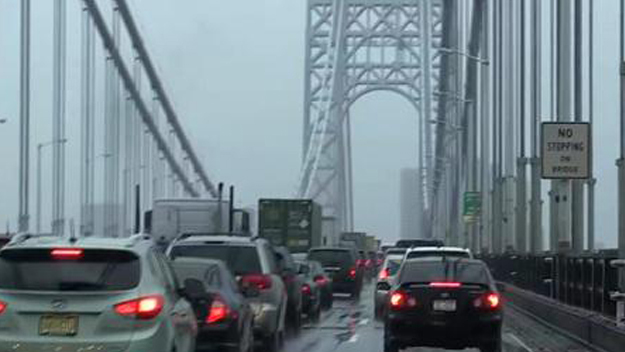
by Teresa Donati
I live in Northern New Jersey, across from New York City. The George Washington Bridge’s New Jersey side is in my town. We are notorious for traffic congestion at rush hours. We are legendary for the one-plus-hour waits to get onto the bridge. That is to get into the city. Those on the other side of the bridge, trying to get to New Jersey, often fare much worse. And the tunnels to and from New York, from towns south of the bridge, are typically not speedier. Rush hour means that nothing moves quickly, anywhere.
A local news station reports the accidents, tie-ups, and delays, as they are happening. ‘Nightmare on Main Street’ (our Main Street is an in-town access to the bridge) should be its own movie.
And why a nightmare?
Because on local roads, and on the highways feeding both into town, and onto the bridge, the drive is harrowing. Drivers report rudeness, impatience, nastiness, sometimes insults shouted from a lowered window to another car, horn-blowing (which is not legal), and exasperation, which is the most benign of all these. It does not change. It is the same every morning of the work week, and every holiday, and every Sunday night when people are returning from weekends away from their homes.
Some people listen to music or books on tape to soothe their nerves, children have their electronics, but the drive still takes longer than we hope.
Public transit faces the same congestion as cars, and in my state the stops are not convenient to where many people live. There is a drive to the station for a train, a long walk or a lift from family or friends, to get to a bus stop. One is not driving, but buses are in congested traffic, with slow going. Public transit trains have also had notorious difficulties and tie-ups of their own, alas.
So what is the answer? Why enter the inevitable traffic jam each day, and fret and fuss, and curse and swear (as many report doing, and as occasional passengers may witness), when we all know that rush hour means crowded roads? Why do we raise our blood pressure soon after we fasten our seat belts? Why not try an alternative?
The alternative I advocate is a change of attitude. Turning oneself around. It is a type of metanoia, a change of heart. It is a new orientation to the task of driving on roads where rudeness and impatience are rampant. The attitude means that we begin to drive lovingly.
Before snorting with dismissal, let me remind everyone: the Judeo-Christian we are supposed to have – values also held by Hindus, Buddhists, Muslims, Bahai, Sikh, every God-oriented religion one can think of — embody a respect for others, a love for the stranger and for one’s neighbor, even the odd-looking stranger or the noisy, irksome neighbor.
Love God and love your neighbor. These are familiar injunctions. And everyone driving on the highway or local road in the next land or in front of you or behind you, is your neighbor. What if you had to see them again later today, tomorrow, or sometime when they recognize you and know how you behaved toward them on the road?
And there is even a stronger imperative to drive lovingly. There are the words of Jesus, in John’s Gospel, chapter 13 (KJV):
34 A new commandment I give unto you, That ye love one another; as I have loved you, that ye also love one another.
35 By this shall all men know that ye are my disciples, if ye have love one to another.
In order to hold on to that Commandment, to live out Our Lord’s stunning words – to love each other as HE loved us?! — I would suggest this: See every car as a car being driven by your best friend, with his or her new baby in it. How carefully and patiently would you drive if that in fact were the case?
Note I don’t say, ‘Drive as though your mother/father/brother/sister were in the car.’ There is too much family dysfunction in this world! If I could use an emoji here, it would be of a sarcastic face. Too many of us have parent issues, sibling issues. It wouldn’t work. No, the best thing is to take the attitude that these are all your best friends, that if they are rude or nasty, they are just having a bad day. Oh well, and after all, their babies are crying in the car seat, making them frantic to get home to a diaper bag and another bottle for the infant.
I would bet that Our Lord’s injunction, to love one another as He has loved us, would mean a lot more under those conditions. It’s worth a try. One need not tell anyone else. Just do it, live it. And there is a bonus at the end: less stress on us, more peaceful hearts, more humor, more grace, in a setting where these are so very needed.
It works. I can attest to it.
Just begin. It’s another aspect of the notion, ‘begin with me.’
Teresa Donati is Professor of Sociology (Emeritus) at Fairleigh Dickinson University, now engaged in full-time writing, including church issues, and Christian fiction.

